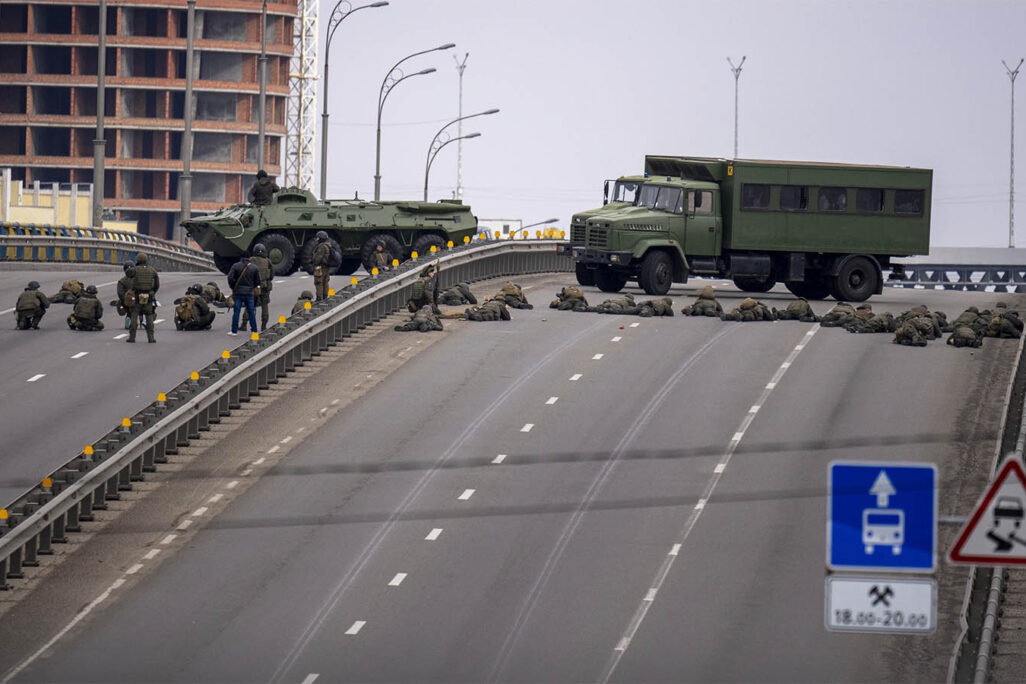
Russia is struggling to achieve a significant military victory in the war in Ukraine. This is having global implications. The lack of a Russian military resolution to the conflict is surprising given the huge military advantage enjoyed by Russia “on paper.”
The Ukrainian military and the civilian population surprised most military commentators with their ability to halt a significant number of ground and armored forces attacks. Even the anti-war demonstrations in Russia surprisingly have not stopped, despite the arrest of thousands of civilians.
״אוקראינה איננה אוייבת שלנו!״ – הפגנת מחאה בסנט-פטרסבורג עוברת ברחובות צרים ונשפכת אל תוך כיכר דבורצובאיה הגדולה, ממש ליד המקומות ההיסטוריים שם היה מרד של תנועת הדקבריסטית נגד הצאר בשנת 1825. pic.twitter.com/nG3INcnSJ0
— Ksenia Svetlova كسنيا سفطلوفا (@KseniaSvetlova) March 6, 2022
The fact that the Ukrainians are fighting for their freedom and are not succumbing to rapid Russian occupation, makes the fighting not only more protracted, but also causes more casualties, both military and civilian. The biggest humanitarian crisis in the country, is the immediate consequence of the continuing fighting, whose price is paid first and foremost by the Ukrainians in their blood and property.
Western countries, led by the United States, have responded by imposing extraordinary sanctions on Russia, including sanctions on the central bank – effectively freezing a significant portion of Russia’s foreign exchange reserves. In the past, these kinds of sanctions have only been imposed on countries such as Iran and North Korea.
Although the definition of sanctions deliberately excluded Russia’s energy export sector, which is most vital to Europe’s energy needs, this sector has also been affected by a growing refusal in the West to purchase oil from Russia.
In light of OPEC’s decision not to change policy on oil production, the result has been a preservation of high oil prices and even a rise in the near future, which has undermined President Biden’s popularity in the U.S. and has contributed to rising inflation worldwide, due to rising sea and land transport prices. The price of a barrel of oil has reached $125 U.S. dollars, a record for recent years.
This explains the determination of the U.S. to sign a nuclear deal with Iran as soon as possible, which will allow some sanctions on the country to be lifted and open the door to the legal supply of Iranian oil on the global market.
Another beneficiary of the current state of war is China. In light of the extraordinary sanctions in the West, Russia is becoming more dependent on economic ties with China than in the past.
World food prices reached a new high in February, rising by about 4% from January. Both Russia and Ukraine are significant wheat suppliers, which explains the rise in price, which is expected to rise as the conflict rages on.
***
Israel is looking for alternatives to importing eggs from Ukraine, but the prices of imported wheat also had an effect on animal feed, and as a result, the price of local dairy and meat products. A high oil price increases fuel prices and costs for transporting goods in Israel, which will support the continued trend of rising prices in the economy.
These conditions are expected to increase the pressure for price increases, which have increased by 3.1% in the past year. Until now, it was expected that prices would stop rising in the coming months. But as the war continues, this increase may actually intensify.
This article was translated from Hebrew by Benji Sharp.






